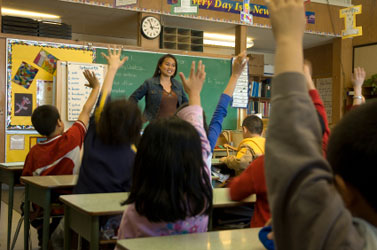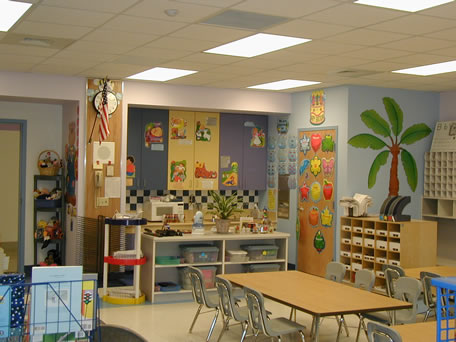A few pieces of advice you may want to consider when starting your first year as a teacher:
-Know in advance that your first year is not going to be a piece of cake. Practically everyone is lying when they say their first year of teaching is going great, for fear of sounding negative or like they don't want to teach. Your first year is going to be tough, most have a hard time believing that until it starts, when it does get tough, just realize that you are not alone. Everyone has to start somewhere.
-Possibly make a list of everything you might possibly need for the next day so that you make sure you have everything.
-Designate a drawer as your 'personal drawer' for things like snacks and water, when you get hungry or thirsty as you stay after late, or even in the middle of the day, some ibuprofen for a headache, and anything else you might need at some random time.
-Be organized. Have a bin for assignments, and other assortments of things, labeled neatly, around the room. It will make it that much less of a hassle if you don't have to search for anything all the time.
- Get support from parents for anything extra you might need. Teachers have to use a lot of pocket money for extra things that the school won't pay for them, so anything that parents can maybe donate is that much less money that you have to spend. They can also help plan activities and help with field trips, be sure to tap into this hidden resource!
- Have an early bedtime. Sleep and health are important, especially for elementary school teachers! You're going to have to keep up with little bundles of energy, after all! So be prepared for that.
- Be aware that things will get better! You have to take the bad times with the good, but hopefully in your future there will be a lot more good than bad. Just be willing to give it all a shot.
-Have fun!
So you've managed to become a teacher? Excellent! You're probably writhing in excitement for your first day of teaching, I know I will be!
There are just a few things to keep in mind as you prepare for the big day:
1. First Impressions- I know we hate to hear it, but first impressions do matter. Students often make the decision of whether or not they like a teacher or think a teacher will do a good job on the very first day of school, whether they do this subconsciously or not. Which means one major thing: be organized. Don't run into the classroom five minutes late, be waiting at the door with a warm smile ready to start the day. Have an exciting day planned out, instead of just winging it. Students can tell, and they expect you to put some effort into them!
2. Organization of the room- Another thing to keep in mind is how you set up and organize your room. You want it to all be on task, instead of randomly scattered about. Have the walls full of bright colors that keep students interested, but not so much that it takes away from their ability to pay attention to you. Also keep in mind how you want their desks organized- do you want them to be set up in groups, or do you want them to all be facing the front? These are all important things to think about. Make sure to look like you put some effort into it!
3. Learn your students- Make sure to put in an effort starting on this first day to learn your students names and some things about them! They'll feel more at home and ready to put more effort into school themselves if they can see you trying to get to know them. Treat them how you want to be treated!
It has come to my attention that there are three main ways that teachers communicate, each deserving attention, so that's what we're going to talk about here.
The three forms of teacher communication, as noticed by me, is teacher-teacher communication, teacher-student communication, and teacher-parent communication.
Teacher-Teacher Communication-- This form of communication comes mostly in the form of questions. It's where more experienced teachers help the less experienced figure out what to do, or give general little tips about the school itself. In some cases there are blogging sites and academic journals, these also mostly giving tips and advice and comments on what works in the ways of teaching and what doesn't. This form of communication is important because without some sort of feedback or help, improvement is not as quick or efficient to occur.
Teacher-Student Communication-- This form of communication is mostly all verbal and comes best when full of praise or criticism, showing the students the best ways to improve and succeed, or what they're doing good. This form of communication is possibly the most important, as isn't helping students to succeed the main purpose of teaching in the first place?
Teacher-Parent Communication-- This is the most negative and the least occurring of the three types. When teachers make an effort to communicate with parents, it is usually assumed to be that the child isn't doing well or has done something wrong. This occurs mostly over the phone or through parent-teacher conferences. Though in some cases there are organizations like the PTO where parents and teachers essentially work together to make the school a better place. This form of communication is important because students have a much easier time succeeding when they have proper support in their home life.
Teacher Tips: A great way for teachers to communicate with both their students and the students' parents better is class websites (and school websites in general), this is a great way to keep parents up to date and to be better assured that the students are going to do their work! Class Newsletters to be sent home with students are also another great way to keep communication going, especially in poorer areas where not everyone might have a computer at their home.
Before we begin, let's take a look at the current teaching demographics as according to the department of education: Among full-time and part-time public school teachers in 2007–08, some 76 percent of public school teachers were female, 44 percent were under age 40, and 52 percent had a master’s or higher degree. Compared with public school teachers, a lower percentage of private school teachers were female (74 percent), were under age 40 (39 percent), and had a master’s or higher degree (38 percent).
In addition, among both males and females, 83 percent of public school teachers were White, 7 percent each were Black or Hispanic, 1 percent each were Asian or of two or more races, and less than one percent each were Pacific Islander or American Indian/Alaska Native in 2007–08. As you can see, if you're a a white female you basically already have the upperhand when it comes to fitting into the education community as a whole. And if you thought the percentage more famales than male were bad in education, you should take out the high school and middle school teachers, then we'll see how much more skewed the demographics are. The younger the children, the higher percentage that is is female teachers doing the teaching. That's not to say that male teachers aren't allowed, it just doesn't seem to happen as often. Anyway, as far as fitting in goes, there are several things you should make sure to do. For one, make sure to be caught up on all of the education lingo, and don't forget to be caught up on all of the current trends, such as learning styles in education. Your first year is to be the most magical of them all, don't let a fear of fitting in stop you from doing the best that you can! There's so much excitement, and you learn so much! Whether it's your first year teaching at all, or your first at a new place, there will usually be someone there willing to be your mentor, guiding you through your new work place, teaching you the school norms and culture. They'll help shed light on the official and hidden culture (the stuff that is stated outright, and the bits that are implied), and comfort you through difficult times. Don't be afraid to ask questions. Teacher to teacher communication is one of the more important ways in which teachers communicate (along with communicating with students and parents), if you're in a rough spot where a difficult situation comes up and you don't know quite what to do (and this will happen, particularly when you're just starting out) there will always be someone willing to help you out! Teachers are generally quite supportive of each other.
|


 RSS Feed
RSS Feed